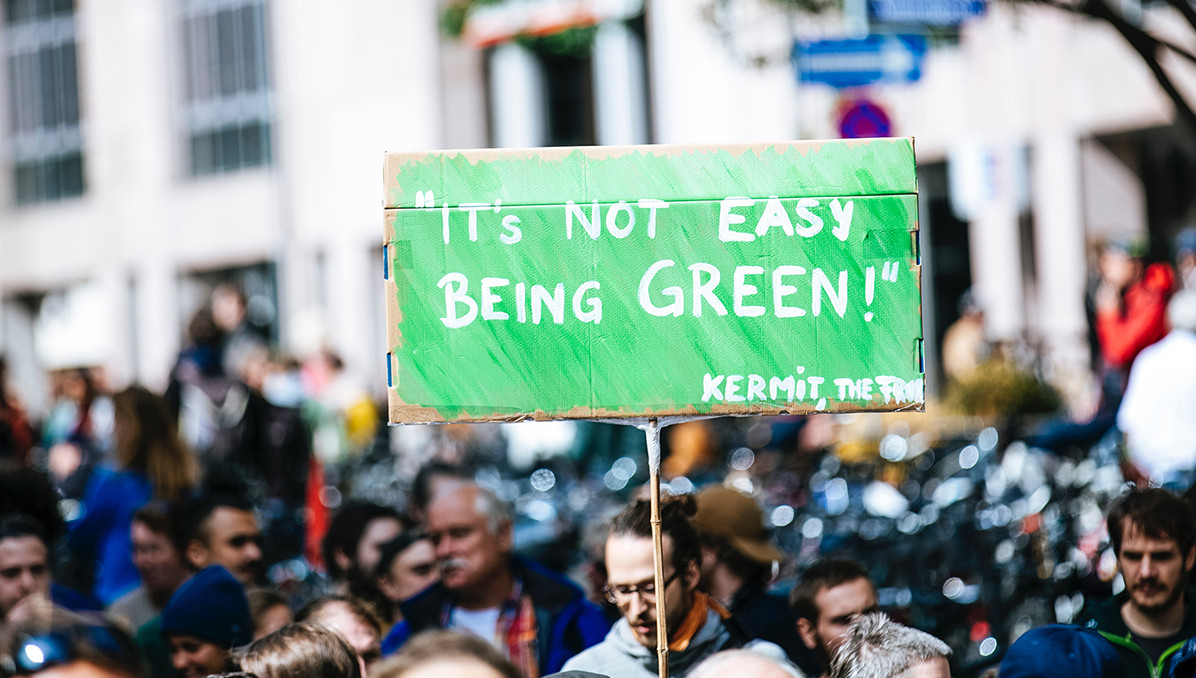‘Oh, another bullshit-bingo marketing buzzword,’ I hear you thinking. Yep, you certainly have a point. Whilst purpose marketing may still be hot and happening, a lot of experts are already done with it. That’s not strange, as it kind of falls in the same category of bland meaninglessness as ‘people planet profit’, ‘going green’, and the catch-all ‘we're sustainable'. Yes, it sometimes feels like self-congratulation, but, then again, it does 'stick'. Why? And is it important?

What is purpose marketing again?
Purpose marketing is, if we’re really direct, saying you’re not just in it for the money. But is that really the case, or have organizations seen that it just sells well?
To give a good example: the hundred companies known for being the biggest polluters, all have sustainability goals and commitments. They share an annual sustainability report and have many photos of smiling children on the relevant webpages. That’s what we call ‘greenwashing’ (or whitewashing, pinkwashing and even bluewashing, depending on the subject the organization is showing off about). Often, it comes down to claiming stuff you weren't really responsible for so you can make a profit from a social or environmental issue. When we talk about purpose marketing, that’s where the shoe pinches. Are you really sincere (and credible) if you’re a pen factory claiming to want to stop global warming or to stand up for gender equality? On the other hand: should we throw purpose marketing on the garbage heap of old marketing hype? Let’s hold off on that for just a little while.
Purpose & promise
Sustainability is a mega trend. Looking at the news, activism and public preferences, it doesn't seem to be something that will just blow over. So, it's a very good thing that companies feel called upon to do something about their own impact on the world: they have a purpose - in addition to profit. But that’s also where things often go wrong. Because what exactly are you going to do then? What is your greater goal now? Things go wrong, because organizations get up on their high horses, take little action, and sometimes even have operations that contradict their own claims.
There are, however, also brands with big promises that do deliver. No one can truly live up to Patagonia's promise 'We're in business to save our home planet', but it is a mission built on real actions, not just words. Companies that have earned their spurs in sustainability and reducing their impact for years have built worthy reputations. But a company that just decided a few months ago that it would be good to ‘do something with purpose marketing’, obviously doesn't have that. And in-authenticity is something that your target audience sees right through, like a needle in a balloon (spoiler: that was your brand image just there). Such a blow can hit hard.
Back to base
But don't worry, sustainable entrepreneurship is still on the map and while many ships have already sailed, you still haven't missed yours yet. Because you can always go back to the core, the base, the heart of your organization, to discover what your real purpose is. You do this in a brand session, in which you re-position yourself, sharpen your brand story, fill in a brand circle… In short, you make sure you cover the entire basis of your brand. Of course, it varies how thorough that approach is. By re-evaluating, you can also determine what that purpose is again.
Then, ask yourself what your product or brand can do. What Impact can It really have? And where will that impact be? But also: which values belong to it, and how do you apply them to yourself? Saying that people always come first is nice, but then forsaking your staff at the first setback is, of course, a huge mistake. You don't have to save the world (you can't), but what can you do?
Below are a few tips that can contain your purpose or raison d'être, or whatever you want to call it.
Keep it simple: formulate a goal that you can describe in one sentence. Don’t get all ambitious trying to write a whole book which no one will read anyway! You also have to want to make the goal actually happen - even if it costs you money.
Make it inspiring: if it doesn't give you a warm feeling, goosebumps or shivers, why would anyone else want that?
Keep it executable: you should be able to take steps towards your goal right away. It’s doing, not just saying.
Know your limits: Stephen Covey wrote about the sphere of interest and sphere of influence in his 7 Habits of Highly Effective People. Stay within what you can influence, where your product can make the difference.
Choose the right words: Making eco-toothbrushes won't solve ocean pollution. But you can at least contribute to the solution. Unless you have a backpack full of evidence, opt for the modest way of presenting it.
Need a helping hand?
Digging deep into your brand essence isn’t easy, it’s something quite difficult that a lot of organizations get stuck on. Luckily, we’ve got good news: at GI, we’re ready to help! As Rage Against the Machine once sang (if we're talking about a bit of activism): "What better place than here, what better time than now?" or, if you're a little more into summer vibes, Desmond Dekker: "You can get it if you really want, but you must try, try and try..."
We do that in an intense but fun session. It is refreshing and nice to work on - and it’s healthy for your brand. In such a session, with workshop and brainstorm elements, we will reformulate and take a look at your possibilities. We do this at your place or ours, but also remotely. We’ve got years of experience with brands in very different industries. So, ready for a purpose party?